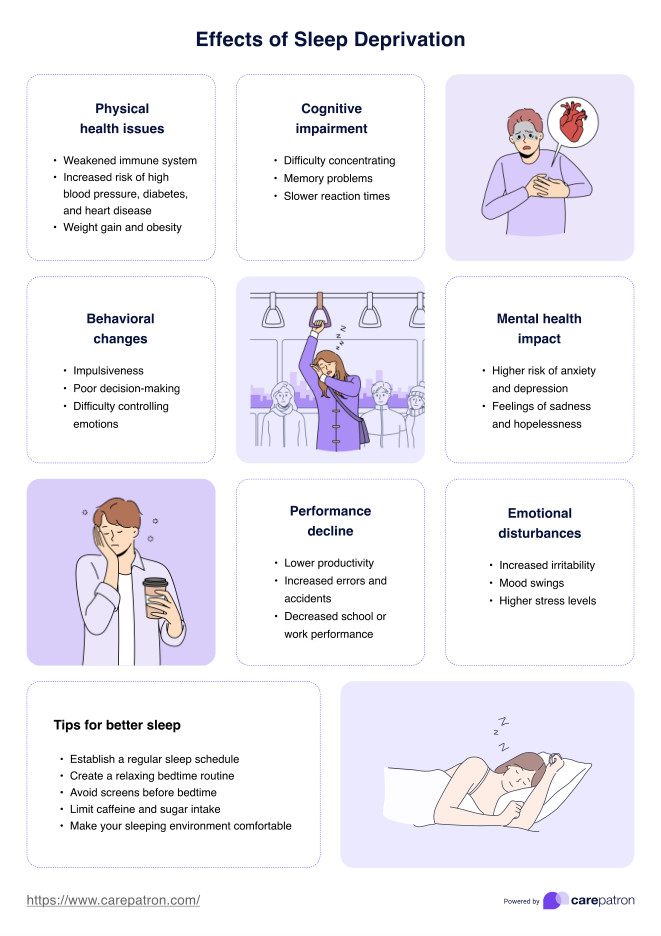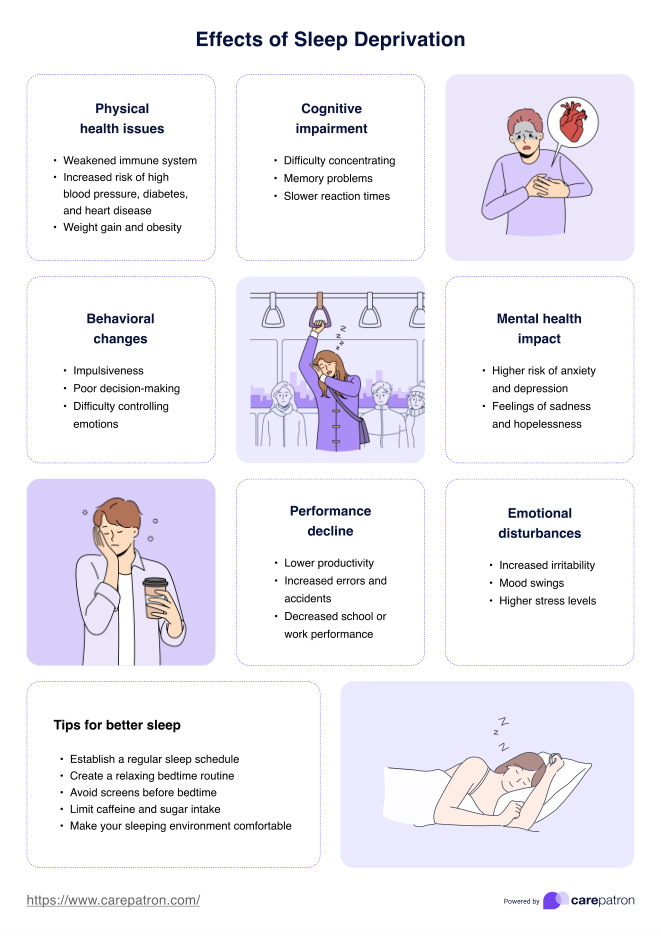Effects of Sleep Deprivation Handout
Use our handout to educate patients about the Effects of Sleep Deprivation and some tips on improving sleep.


What is sleep deprivation?
Sleep deprivation occurs when an individual gets less sleep than they need to function optimally. For many people, insufficient sleep might stem from lifestyle choices, such as pulling all-nighters for work or school or sacrificing sleep to socialize and have fun. These occasional lapses can seem harmless, but when they become habitual, the consequences add up quickly.
On a more serious note, sleep deprivation can also be caused by underlying medical conditions. Untreated sleep disorders like insomnia, sleep apnea, and restless leg syndrome can lead to trouble sleeping. Additionally, mental health conditions such as anxiety and depression can disrupt sleep patterns, leading to chronic sleep deprivation. Certain medications, shift work, and high-stress environments can also contribute to ongoing sleep deficits.
How is sleep deprivation diagnosed?
Diagnosing sleep deprivation involves thoroughly examining medical history and assessing the symptoms of sleep deprivation:
- Daytime sleepiness: Persistent tiredness and the urge to sleep during the day.
- Difficulty concentrating: Trouble focusing on tasks and slower reaction times.
- Mood changes: Increased irritability, anxiety, and depressive symptoms.
- Impaired cognitive function: Reduced ability to think clearly and make decisions.
- Physical fatigue: Feelings of lethargy and exhaustion throughout the day.
- Sleep disturbances: Issues such as waking frequently at night or taking longer to fall asleep
In addition, you examine the patient’s sleep patterns, including duration, quality, and factors disrupting sleep. You may use tools like sleep diaries and the Pittsburgh Sleep Quality Index (PSQI) to evaluate your patient's sleep quality over time.
If you suspect a sleep disorder, a sleep study (polysomnography) may be recommended to monitor brain activity, heart rate, and breathing during sleep. Symptoms like excessive daytime sleepiness and difficulty concentrating also help identify the impact of sleep deprivation on daily life, guiding the development of a tailored treatment plan.
Effects of Sleep Deprivation Handout Template
Effects of Sleep Deprivation Handout Example
6 effects of sleep deprivation
Sleep deprivation can lead to a wide range of negative effects on the body and mind. Here's what can happen if you don't get a good night's sleep for a long period of time:
Health issues
Lack of sleep weakens the immune system, making individuals more susceptible to illnesses like colds and infections. Over time, chronic sleep deprivation can increase the risk of serious health problems such as hypertension, diabetes, and heart disease.
Cognitive impairment
Sleep is crucial for brain function. Without enough sleep, cognitive abilities such as memory, attention, and decision-making are significantly impaired. This can lead to difficulty concentrating, forgetfulness, and slower reaction times.
Behavioral changes
Sleep-deprived individuals often exhibit changes in behavior, including irritability, mood swings, and decreased motivation. These changes can affect personal relationships and work performance, leading to conflicts and misunderstandings.
Mental health impact
Sleep deprivation is closely linked to mental health issues such as anxiety, depression, and stress. Chronic lack of sleep can exacerbate these conditions, creating a vicious cycle where mental health problems further disrupt sleep.
Performance decline
Inadequate sleep leads to a decline in physical and mental performance. This includes decreased productivity at work or school, increased errors, and a higher likelihood of accidents, especially when driving or operating machinery.
Emotional disturbances
Lack of sleep can cause emotional instability, making individuals more prone to negative emotions such as anger, frustration, and sadness. Over time, this can lead to emotional burnout and strained relationships with others.
How does our Effects of Sleep Deprivation Handout work?
Our Effects of Sleep Deprivation Handout is a practical tool designed to help healthcare professionals educate patients about the importance of sleep and the potential consequences of sleep deprivation. It serves as a quick reference guide, summarizing key information in an easy-to-understand format.
Step 1: Access the template
First, access the Effects of Sleep Deprivation handout through our platform. You can view, download, or print the handout, making it easily accessible for patient consultations or educational sessions.
Step 2: Introduce and provide the handout
Introduce the handout to your patient, highlighting key points and explaining the importance of understanding the effects of sleep deprivation. Give them a copy to take home or suggest they keep it where they can easily refer to it. This handout is especially useful for educating and reminding both adults and children about the importance of sleep, making it an excellent resource for a wide range of patients.
While our template includes some tips to prevent sleep deprivation, consider looking at our other resources to learn more about better sleep hygiene.
Benefits of using our Effects of Sleep Deprivation Handout
Using our Effects of Sleep Deprivation Handout provides several key advantages for healthcare professionals and their patients.
Patient education
The handout simplifies complex information, making it easier for patients to understand the serious implications of sleep deprivation. It empowers them with the knowledge to recognize and address sleep issues.
Improved patient engagement
With its clear layout and inclusion of images, the handout captures attention, particularly among younger patients. This visual aid enhances learning and retention, encouraging patients to take the content seriously.
Easy reference
The handout serves as a convenient reference tool that patients can use at home. By having the information readily available, patients are more likely to follow recommendations and make necessary lifestyle changes.
Versatility in use
This handout is versatile, suitable for a variety of settings. It can be used effectively to spread awareness about the importance of sleep in patient consultations, educational sessions, or even community health programs.
Commonly asked questions
If you haven't slept in 3 days, you should seek medical attention immediately. Severe sleep deprivation can have severe, life-threatening health consequences and requires prompt evaluation. Chances are, something else might be causing your low-quality sleep.
To cope with severe sleep deprivation, prioritize sleep hygiene, avoid caffeine, and consider consulting a sleep specialist for advice on managing sleep disorders or a prescription for sleep medicine.
Yes, your brain can recover from sleep deprivation, but it requires consistent, good-quality sleep over several days or weeks to fully restore cognitive functions.
Recovery from sleep deprivation can take a few days to several weeks, depending on the severity of the deprivation, the quality of subsequent sleep, and how much sleep you get. If you get enough quality sleep, your condition will eventually improve.





















-template.jpg)


















































































